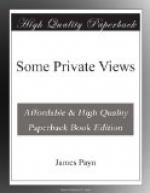I remember, in my own case, that, from that reverence for authority which I hope I share with my neighbours, I used to speak of ’Headlong Hall’ and ’Crotchet Castle’—both great favourites of our fore-fathers—with much respect, until one wet day in the country I found myself shut up with them. I won’t say what I suffered; better judges of literature than myself admire them still, I know. I will only remark that I don’t admire them. I don’t say they are the dullest novels ever printed, because that would be invidious, and might do wrong to works of even greater pretensions; but to my mind they are dull.
When Dr. Johnson is free to confess that he does not admire Gray’s ‘Elegy,’ and Macaulay to avow that he sees little to praise in Dickens and Wordsworth, why should not humbler folks have the courage of their own opinions? They cannot possibly be more wrong than Johnson and Macaulay were, and it is surely better to be honest, though it may expose one to some ridicule, than to lie. The more we agree with the verdict of the generations before us on these matters, the more, it is quite true, we are likely to be right; but the agreement should be an honest one. At present very extensive domains in literature are, as it were, enclosed and denied to the public in respect to any free expression of their opinion. ‘They are splendid, they are faultless,’ cries the general voice, but the general eye has not beheld them. Nothing, of course, could be more futile than that, with every new generation, our old authors who have won their fame should be arraigned anew at the bar of public criticism; but, on the other hand, there is no reason why the mouths of us poor moderns should be muzzled, and still less that we ‘should praise with alien lips.’
‘Until Caldecott’s charming illustrations of it made me laugh so much,’ said a young lady to me the other day, ’I confess—though I know it’s very stupid of me—I never saw much fun in “John Gilpin."’ She evidently expected a reproof, and when I whispered in her ear, ‘Nor I,’ her lovely features assumed a look of positive enfranchisement.
‘But am I right?’ she inquired.
‘You are certainly right, my dear young lady,’ said I, ’not to pretend admiration where you don’t feel it; as to liking “John Gilpin,” that is a matter of taste. It has, of course, simplicity to recommend it; but in my own case, though I’m fond of fun, it has never evoked a smile. It has always seemed to me like one of Mr. Joe Miller’s stories put into tedious verse.’
I really almost thought (and hoped) that that young lady would have kissed me.
‘Papa always says it is a free country,’ she exclaimed, ’but I never felt it to be the case before this moment.’
For years this beautiful and accomplished creature had locked this awful secret in her innocent breast—that she didn’t see much fun in ’John Gilpin.’ ‘You have given me courage,’ she said, ’to confess something else. Mr. Caldecott has just been illustrating in the same charming manner Goldsmith’s “Elegy on a Mad Dog,” and—I’m very sorry—but I never laughed at that before, either. I have pretended to laugh, you know,’ she added, hastily and apologetically, ‘hundreds of times.’




